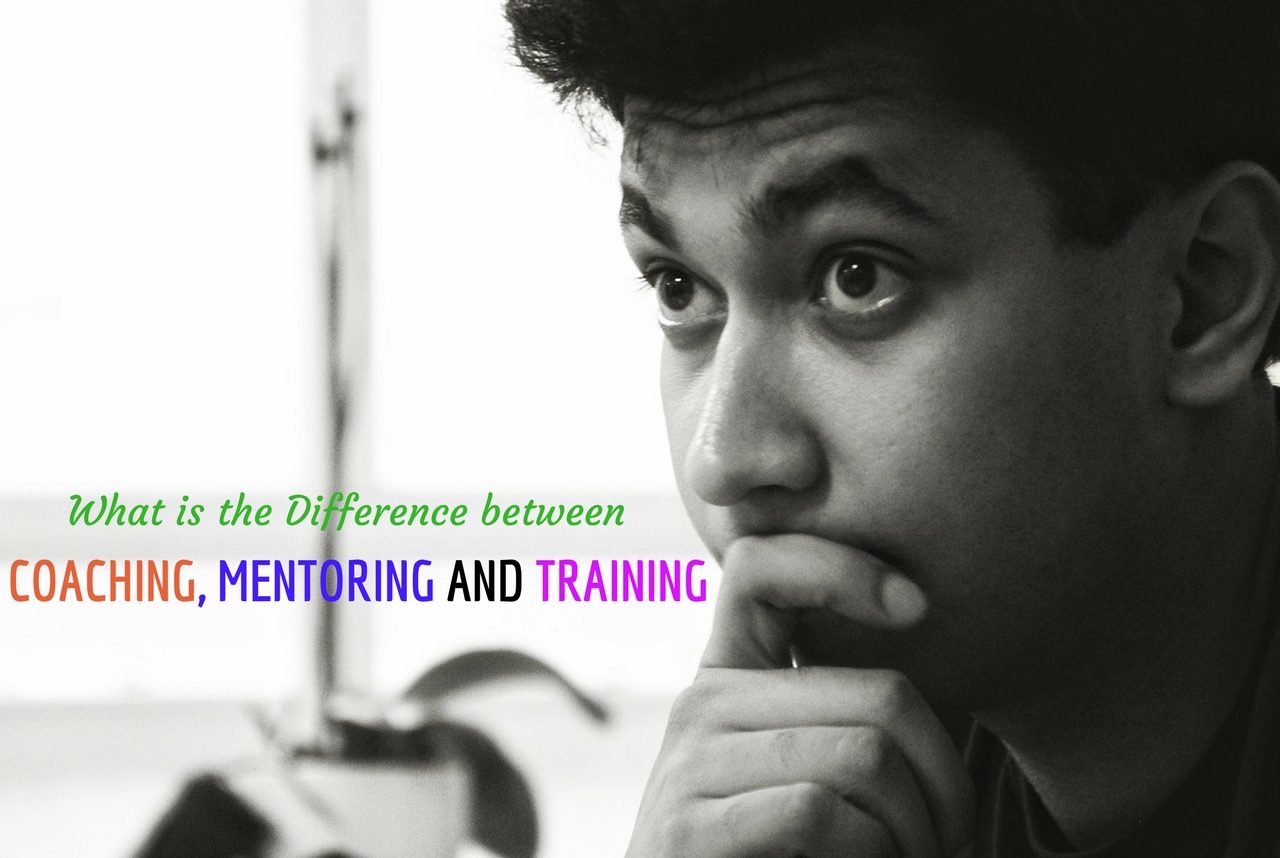‘Jamie is your coach, while Samantha is your mentor.’ Will you be able to explain, what is the difference between the two?
I am sure, most of you will end up giving a confusing statement. It is not our fault alone, but there are numerous out there who despite being adults are not clear about the difference between coaching, mentoring, and training.

For most of them, these 3 are same things with different terms.
But I am writing this post to make it very clear that not only these terms differ in their pronunciation and spelling, but also in their meaning.
Yes! Training, coaching and mentoring may look somewhat same, but they differ a lot in terms of sense they make and the meaning they hold.
Coaching, Mentoring, and Training – The Similarity Between them!
Now before I jot down the various differences between these three aspects, I am going to first list down the similarities between them.
Here, I want to share an example,
‘Now consider yourself being in a training program at your college, workplace, or be it any other place. Being in training implies that you must be getting training from a specialized trainer.
If the training session is followed by another session from an experienced mentor then surely you are receiving mentoring. Eventually, the session ends with tips from an expert coach, and hence, what you receive is coaching.’
So, considering this example it is clear that training, mentoring and coaching have one common trait, which is the expertise. No matter to which field you belong and which division you undertake in the future avenues of your life, these practices are followed by experts in their respective divisions.
To make it more clear let me discuss each of them individually.
What is Mentoring?
It is an informal relationship between two individuals. Your mentor will do as many things ideal for your career and life as a whole, which your coach or trainer would also do, but he is not bound by any legal obligation for it.
You cannot appoint a mentor. This type of relationship develops over time from a professional association or friendship. Over years, your relationship with your mentor intensifies. In most cases, the mentor shares his experience and knowledge with you in an informal way.
You can consider anyone as your mentor whom you consider successful and desire to be like one. Your mentor guides you through all ups and downs of your life and over time your relationship with the mentor intensifies and can even transform into a long-lasting friendship.
Who is a Mentor?
Since mentoring is more of an informal relationship, so a mentor can be a person with whom you can interact well. For such reasons, a mentor is someone from the friends, colleagues or individuals with whom you are comfortable talking to.
A mentor is mainly from the same industry. The mentor hosts pool of knowledge to share with you as well as an appetite for improving your self-being.
It is readily acknowledged but the relationship is usually unlabeled. Over the course of time, your relationship with your mentor may evolve or may settle at a point of respectful peers.
Traits of a Good Mentor:
So, if you consider someone to be your mentor then make sure he has these following traits.
- A mentor offers guided learning and is an expert in his field or industry.
- His work is mainly focused towards an eventual goal. Even you can limit the level of knowledge and interaction you want to share with your mentor.
- In most of the cases, your mentor will define limits for the work done.
- Your mentor must offer you ways and guidance to help you improve.
- Mentor plays a crucial role in developing and encouraging individuals. He must always offer encouragement and support so that you can enhance efficiency.
- Your mentor must be able to offer support to resolve official as well as personal issues that impact your performance.
What is Training?
Now, when I am talking about training then don’t limit your thought to simply classroom training. It is not the only type of training. There are various types of training like on-the-job training, e-learning, and other methods of training.
If I talk about training, then it is a more formal process. Training is practiced with well-defined learning objectives and is quite brief in comparison to the mentoring and coaching.
Training may include various interactions that are identified in coaching scenario, but the main focus is on the core subject.
During the training process, the trainer shares his extensive knowledge and experience in the subject with the individuals. At the end of the training process, it is expected that the participants have gained knowledge from the trainer. Hence, it can be considered as a transfer of knowledge from one to many!
Training can be flexible and it is not essential that the trainer needs to stand and give a public speech. Training can be practiced in various types. Case studies, discussions, e-learning sessions, simulations and other interactive forms all constitute training.
Who is a Trainer?
A trainer is an experienced and knowledgeable person who intends to facilitate the learning process of another individual.
If a person lacks knowledge or skills about a particular task then he requires training. A trainer is accountable to teach a person the perfect way to perform a specific task. Even he is responsible to ensure that the individual progresses and learns the skills needed to perform a specific task.
Once the trainer imparts complete knowledge to the trainee and the trainee is able to perform the task at the desired level of proficiency, then training is complete.
Traits of a Good Trainer:
Training is a short-term process and intends to impart desired knowledge and skill to a person. So, if you hire a trainer then make sure it possesses all these important traits.
- The trainer brings the person to a desired level of efficiency.
- The trainer outlines various practice and instruction sessions to ensure that the person gains absolute proficiency in the field.
- A trainer is hired or assigned for a short duration when a person lacks knowledge or skill about completing a task.
- The trainer adapts his content delivery depending on the task to be performed.
- The trainer is responsible to ensure that the trainee gains required knowledge and skills from the training session.
What is Coaching?
A coach is a person who stays with you from the beginning of the situation. The coaching is instigated with a specific aim to achieve. There is no specific duration for coaching and it can be short-term as well as long-term.
The aim of coaching is to ensure that the person reaches his goals and once the goals are achieved, then the relationship can be re-evaluated.
Coaching can be of various types depending on the coach you hire. Some of the common types of coach are:
Socratic Coach:
Such types of coach ask lots of examining questions to the person.
Intervention Coach:
This type of coach mostly observes during a specific situation. His intervention is subject to help a person select a particular action or path.
Guiding Coach:
This type of coach offers constant and gentle reminders to help a person keep up with a particular task and action.
Hands-on Coach:
Such coaches offer individuals with a way to resolve a problem. But he does not take any decisive action.
Who is a Coach?
I have mentioned about various types of coaches. So, coaches can vary in nature and traits depending on the specific task they are hired for. The relationship between a person and a coach is completely professional. Though there is a specific goal to achieve, there is no specific time frame for the same.
Traits of a Good Coach:
A good coach is one who:
- Guides the individual on the task to be accomplished.
- He ensures that the individual is always focused and encouraged to achieve the goals and complete the task.
- He tries to solve the problem with a way of questioning.
- The main aim of the coach is to explore various possibilities to a problem and then let the individual decide the final decision.
Difference between Coaching, Mentoring, and Training:
Have a glance at various differences between these aspects:
1. Emphasis or Focus:
Coaching focuses on concrete issues like managing more efficiently, speaking precisely, learning the best way to think strategically, and hence, is task oriented. It is essential for a person to be expert in the field of coaching.
Mentoring, on the other hand, is relationship oriented. It aims to offer a safe environment where a person can share his issues with the mentor. The person can share business, professional as well as personal issues with the mentor. The mentor focuses on areas beyond self-confidence, work-life balance and self-perception.
Training is focused on the development of novel skills. It emphasizes on refreshing old skills as well as developing new skills and knowledge required to complete a specific task.
2. Tenure:
Coaching is practiced for short-term. The coach is involved until the time the task is not completed and the desired goals are not achieved. It lasts long only until the time it is needed.
Mentoring is practiced only on a long-term basis. It is a relationship that develops over time and gradually develops a climate of trust. Successful mentoring relationships can last a lifetime.
Training is practiced for short time. It can range from few days to few weeks and months. It is practiced to complete a specific task. Once the task is completed then training is also completed.
3. Purpose:
The purpose of coaching is to enhance the performance of an individual in a specific field or job. It involves enhancing the present skills or acquires new skills. Once the person gains the skills then the coach is no more needed.
The purpose of mentoring is to develop the individual not for the present job, but for an entire lifetime.
The training tries to inculcate different skills in a person so that he can gain success in all aspects of the life.
4. Relationship:
Coaching can be practiced on any specific topic. If it involves large numbers of individual then it would involve determining the competency area, assessment tools, and expertise needed.
Mentoring is done to determine the strategic purpose. It focuses on specific areas and the mentoring models. The aim of mentoring is to focus on the relationship and on particular mentoring models.
Training is high transaction and is carried for few days. The ownership of the trainer is to impart the skills.
5. Approaches:
During the process of coaching, the coach asks questions in order to explore the learner’s potential. The approach is completely professional and the aim of the coach is to develop new skills.
The mentoring process involves asking questions as well as offering solutions at the same time. The approach is experienced based and the relationship evolves over time.
Training involved various activities, exercises, discussions, and role plays to offer knowledge and skill to the trainees. The goals are identified at the beginning and then adequate approaches are practiced to reach the desired outcome.
6. Outcome:
As the final outcome of coaching, it is expected that a person gains knowledge of applying the skills. It is expected to gain an enhanced awareness of impact and behaviors. Even the person is expected to gain increased confidence.
Once mentoring is done then the person is expected to gain increased clarity on career, direction, and role. Increased confidence and enhanced awareness are additional traits expected.
Training imparts a person with the enhanced skill set. Hence, it is expected that the person will be able to apply the skills efficiently and make the best possible outcome for a task.
Coaching, mentoring as well as training are important services, if properly applied can be a rich support for growth and development of an individual. While all three of them are important equally vital is to have a clear understanding of them.











































